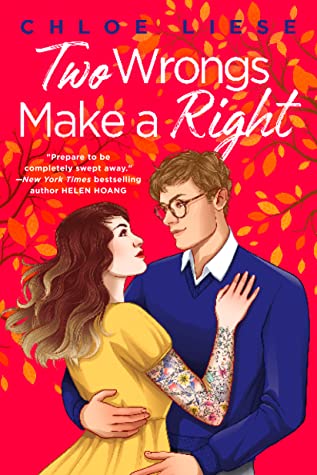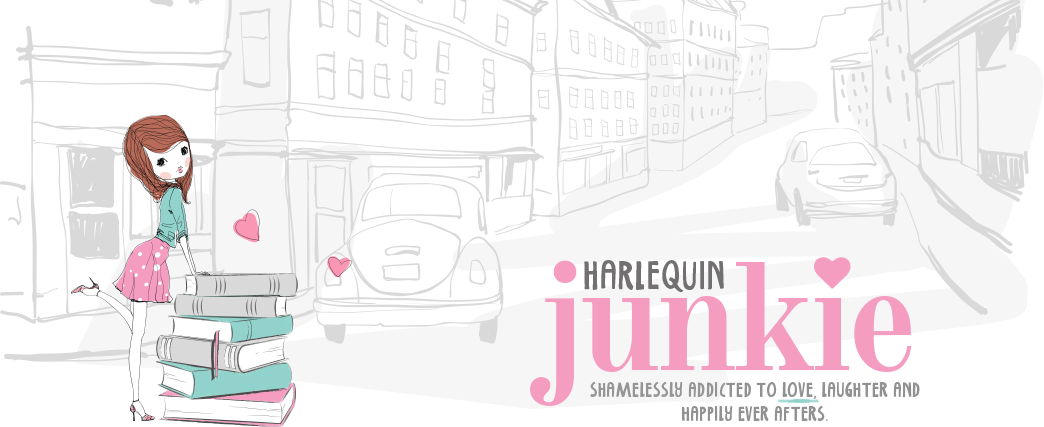Today it is my pleasure to Welcome author Chloe Liese to HJ!

Hi Chloe and welcome to HJ! We’re so excited to chat with you about your new release, Two Wrongs Make a Right!
Hi! Thanks for having me.
Please summarize the book for the readers here:

Please share your favorite line(s) or quote from this book:
“I don’t see you differently. I see you better.”
Please share a few Fun facts about this book…
- The inspiration for this book came when I was watching a lovely film adaptation of Much Ado About Nothing (starring Emma Thompson and Kenneth Branagh), and this thought popped into my head: What would Beatrice and Benedick have done if they’d found out early on rather than at the end of the story that they’d been set-up by their friends and family?
- I’m neurodivergent, as are a lot of people I know and love. Both Jamie and Bea are neurodivergent too, and while part of how they share and express that truth with each other is poignant, it’s also playful too, the heartbeat of their banter, the pulse of their physical comedy moments. To me, one of the most liberating aspects of being diagnosed as neurodivergent and better understanding myself (beyond the immense gift of greater self-acceptance and self-care) has been allowing myself to laugh and feel joy for how neurodivergence shapes me, including when it involves clumsiness or misinterpreting a question, missing a social cue, things that cultural pressures of “normality” or neurotypicality could otherwise make me feel ashamed of. Leaning into the humor is empowering to me, because it’s in effect saying, “I’m not going to feel ashamed, I’m going to have fun and appreciate that these moments because they’re part of what make me me.” Lots of Shakespeare’s humor actually falls along these lines: double entendres, characters misunderstanding each other, physical comedy and mishaps. Maybe Shakespeare was neurodivergent, too. Or maybe he just understood that laughing with each other is infinitely better than laughing at each other, and that stories embracing this truth make for fantastic comedy.
- Throughout the book, there are tiny quoted phrases and paraphrased lines from Much Ado About Nothing. Theater/Shakespeare nerds will (I hope) have fun finding those throughout.
- I wrote this book to a playlist that I’ve included at the beginning of the book, one song for each chapter. To me, a playlist works like the soundtrack to the movie that unfolds in my mind as I write, and I love getting to share that music with my readers when the book is finished, too. For those who are Spotify users, the playlist can be found here:
https://open.spotify.com/playlist/7HCPVFQlLiU6GuT4kDnQZd?si=3cd95843fbcd49f7
What first attracts your Hero to the Heroine and vice versa?
Jamie is drawn to Bea’s honesty and authenticity. She doesn’t sugarcoat her feelings or hide her true motives. There’s a lot of safety in that honesty, and freedom in being around someone who’s their unapologetic self while inviting you to be your unapologetic self too. Neither of those experiences are very familiar to him, but he craves them.
Bea is drawn to Jamie’s goodness and gentleness. Even though he drives her up the wall with all his moralizing and rule-abiding, she sees that at the heart of those behaviors is his desire to do what’s right; to be a caring, thoughtful person. Knowing she can trust his integrity, she starts to see past his prim propriety and strictness and realizes there’s actually just a very big softie underneath that starched shirt.
Did any scene have you blushing, crying or laughing while writing it? And Why?
The scene in which Jamie teaches Bea how to waltz was one of those chapters that’s my absolute favorite because it hit every note I love in romance: It felt sexy and vulnerable and a little funny, and it showed their walls coming down, their hearts opening up to each other. Here’s a little bit of that scene:
“His left thigh presses into my right leg, and I step back, trying to remember the pattern. Back, side, close. Front, side, close.
“Bea.”
My eyes snap up and meet his.
“Don’t think about it,” he says softly. “Just follow my body.”
“Right.” I grip him tight, nervously anticipating the moment I’ll misstep and stomp on his toe again. But as Jamie holds me close, sweeping me into the rhythm, I find it harder and harder to think, easier and easier to feel . . .
Jamie’s hand spread across the curve of my back.
Those long, strong legs guiding mine.
His solid arms drawing me forward, side, back.
Staring at his mouth, I feel my control slipping. I want dancing to become more. I want Jamie to want me the way I want him. But I can’t risk sabotaging everything—not just our revenge, but this fragile friendship we’ve grown.
So I try to distract myself. Besides looking at Jamie, all that’s left is looking down, where I see our bodies moving in a steady, undulating rhythm. That does not help.
Jamie doesn’t help, either. He’s silent. And when I meet his gaze, it’s intense, locked on me, and so hot I nearly step on his foot. He senses it and pushes me through to the next step, eyes never leaving mine.
“Any, um . . .” I clear my throat. “Any other dance etiquette I should master?”
He tips his head so slightly, searching my face. “Well, when it’s an intimate dance like the waltz, you can hold each other’s eyes. But I know that’s not always comfortable for you. So you can look elsewhere.”
“Elsewhere?” I tease, wiggling my eyebrows.
Jamie doesn’t smile as his gaze roams my face. “Yes. So long as it’s me.”
Readers should read this book….
If you enjoy Talia Hibbert’s and Helen Hoang’s books, rom-coms that not only give you banter and humor but also character growth, emotional depth, and steam, as well as a compassionate, empowering portrayal of neurodivergence.
What are you currently working on? What other releases do you have in the works?
I’m working on wrapping up the last two books in my independently published series, the Bergman Brothers, contemporary romances about a big Swedish-American family that might remind some of how the Bridgerton books by Julia Quinn unfold (interconnected standalones, one book per sibling, where the reader gets little peeks into previous couples and get to revisit the family’s story world in each installment). The next book in the Bergman series will be out in Spring of 2023.
After that will be the second book in this story world, coming Fall 2023. Two Wrongs Make a Right is the first in a three book series, one for each Wilmot sister, and the second book that follows it was a challenge but such a rewarding story to write.. I really love how it turned out, and while it’s quite different from Bea’s and Jamie’s book, I hope my readers will love it, too!
Thanks for blogging at HJ!
Giveaway: A print copy of TWO WRONGS MAKE A RIGHT by Chloe Liese, US only.
To enter Giveaway: Please complete the Rafflecopter form and Post a comment to this Q: Irony abounds in both Much Ado About Nothing and in Two Wrongs Make a Right. In Much Ado, Benedick and Beatrice are tricked by their friends into overhearing their rehearsed discussions of the other’s feelings for them, but the irony is, while the specifics of what their friends say are lies, this deception leads Benedick and Beatrice to recognize the truth: they do have feelings for each other; they’ve just been terrified to admit or act on them. What do you think are the parallel situation(s) and irony in Two Wrongs?
Excerpt from Two Wrongs Make a Right:
I stare at her as she assesses the game, warring with myself. Should I consider this? Why would I bend my rules and agree to a plot for revenge—a plot that will routinely not only subject us to each other but require pretending to be in a relationship? Am I honestly entertaining a faux romance—a fauxmance?—with a woman with whom I’ve shared nothing but physical catastrophe and a dozen stinging verbal paper cuts?
Except this past week. Except those text messages. Ben and Addie got along, didn’t they? Why can’t you and Bea?
Damn that moment in the closet. Damn those messages and the smile I felt in them, the laughter I sensed in too many early morning exchanges. Damn Jean-Claude and Juliet and their so-called friends for making this mess even messier than it was.
Suddenly, Bea’s fingertip grazes mine. I nearly knock over my tea.
“Leftie?” she says.
“What?” I stammer. “Oh. Y-yes. Why do you ask?”
She lifts her left hand, revealing ink marks inside her knuckles. “Me, too.”
Her expression is guarded, but this feels like an olive branch. I take it.
“It’s a hard life,” I tell her, “being on the wrong side of the paper.”
“And door handles.”
“Ten-key number pads.”
“Ooh!” she says. “Bicycle brakes.”
I raise my left arm, revealing the scar along my wrist from a fractured distal radius. I overused the left-handed brake that stopped the front wheel and sent me flipping over my bike. “Learned that one the hard way.”
Our eyes meet for a moment, and a flush creeps up Bea’s throat to her cheeks. She glances away, examines her ink-stained fingers. When her eyes drift toward the window, she goes unnaturally still. “Those gloating motherfuckers.”
My gaze follows her line of sight. The meddlers are still there, now seated on the bench where Bea and I met. Jean-Claude’s sprayed-white head is bent, thumbs moving over his phone. Juliet steals glances at Boulangerie behind dark sunglasses, her own phone in hand as if, not too long ago, it was subtly pointed our way.
“Was she filming us?” I ask.
“Probably,” Bea says between clenched teeth. “Taking pictures. Telling the others.”
“The others?”
She arches an eyebrow at me. “Last weekend at the party, you and I didn’t cross paths as much as we did by accident. Margo, Sula, even Christopher—they’re in on this.”
I stare at her, stunned. “Seriously?”
“Very seriously, James.”
My blood pressure spikes, a surge of rare righteous anger burning through me. I’m a chess player. I can appreciate the beauty of a winning strategy. But people aren’t pawns, and their personal lives aren’t games to be played.
“That’s it,” I tell her. “I’m in. I want blood.”
Bea snorts a laugh, glancing my way. “Wow.”
“I mean, that is, m-metaphorical blood. Emotional blood. Wait—”
Stretching her arm across the table, Bea rests her hand on mine. It doesn’t escape me that it’s our left hands, that it’s rare for someone’s touch to mirror mine. It’s unnerving to have something in common with Beatrice.
“I knew what you meant,” she says quietly.
Staring at our hands, I observe my actions as if I’m outside myself, not driving the command center. My thumb sweeps across her palm, tracing faded ink stains and calluses that are evidence of how much work art takes, how messy creating illusions can be. Bea sucks in a breath as my touch slides down to her wrist. She pulls away the same moment I release her.
“Perhaps it’s unwise.” I clear my throat and avoid her eyes. “Pursuing revenge like this. I can’t remember the last time I’ve done something so impulsive or vindictive. But, God, will it feel good.”
“Just think,” she says, “the looks on their faces when we finally break it to them. It’ll be worth it. It’ll stop this meddling, matchmaking bullshit once and for all. Now, what’s our timeline? It has to be long enough to convince them, but not so long that we drive each other off the deep end.”
“Sounds wise,” I agree.
“We ‘date’ until . . . ?”
“Do you all have any traditional gatherings, where breaking up would make a real splash? Christmas perhaps? That might be too long, though.”
Bea scrunches her nose. “Oh, God, no.”
“I’m sorry,” I say frostily, “would that be an insufferably long time to fake date me?”
“Honestly, a little bit. And don’t act like you could stand fake dating me that long, either.”
Fair point. “Thanksgiving? Do your friends have a gathering around then?
Her eyes light up. “The Friendsgiving party! Oh, that’s perfect. Okay, so that gives us . . .”
“A little less than two months.”
“Two months. That’s doable.”
“Agreed.”
Leaning in, she says, “We’re going to have to sell it. I want them eating out of our hands.”
I steal another glance at the bench where our audience sits, texting their coconspirators, feasting on this elaborate joke. Soon, they’ll realize the joke’s on them. “I understand. I’m committed.”
“Excellent. It’s a deal.” She offers her left hand and I take it in my own, the hand I’ve been taught my whole life is the wrong one to offer.
I try to ignore that it feels remarkably right. “Deal.”
Excerpt. © Reprinted by permission. All rights reserved.
Book Info:
Opposites become allies to fool their matchmaking friends in this swoony reimagining of Shakespeare’s beloved comedy, Much Ado About Nothing.
Jamie Westenberg and Bea Wilmot have nothing in common except a meet-disaster and the mutual understanding that they couldn’t be more wrong for each other. But when the people closest to them play Cupid and trick them into going on a date, Jamie and Bea realize they have something else in common after all—an undeniable need for revenge.
Soon their plan is in place: Fake date obnoxiously and convince the meddlers they’re madly in love. Then, break up spectacularly and dash everyone’s hopes, putting an end to the matchmaking madness once and for all.
To convince everyone that they’ve fallen for each other, Jamie and Bea will have to nail the performance of their lives. But as their final act nears and playing lovers becomes easier than not, they begin to wonder: What if Cupid’s arrow wasn’t so off the mark? And what if two wrongs do make a right?
Book Links: Amazon | B&N | iTunes | kobo | Google |
Meet the Author:
Chloe writes romances reflecting her belief that everyone deserves a love story. Her stories pack a punch of heat, heart, and humor, and often feature characters who are neurodivergent like herself. When not dreaming up her next book, Chloe spends her time wandering in nature, playing soccer, and most happily at home with her family and mischievous cats.
Website | Facebook | Twitter | Instagram | GoodReads |


EC
The couple are being matched together and said couple decided to fake date without thinking that they’ll fall for each other…and they did.
Janine
I think I need to read the book to know how to answer the question. I have added it to my wish list. It sounds really good.
debby236
Fake dating turns into something real.
Glenda M
The world of pretend turns into reality
Rita Wray
It’s not a good idea to hide your feelings.
bn100
no idea
Daniel M
just another example of people suck
Dev Davies
The parallel irony is than Bea and Jamie try to trick their friends and end up falling in love.
Diana Hardt
I’m not sure.
Dianne Casey
Trying to ignore they are falling in love.
Mary C
Pretense becomes reality.
Lori Byrd
Fake becomes love.
Amy R
Fake dating ends up turning real which is a trope I like.
Katrina Dehart
I would like to say I know, but really no idea
Texas Book Lover
I haven’t read it yet so I’m not sure…
Leanna Hiner
Sometimes your friends know how you feel before you admit your feelings to yourself.
Bonnie
Bea and Jamie try to trick their friends and end up falling in love.
Jen
I think the irony is that even though they fake dated to get back at them for being pushed together and setup, that they ended up becoming friends and realizing how much they truly were right for the other. And fall in love along the way.
Linda Herold
I think it’s about what happens to those who are fake dating.
Terrill R.
That is a convoluted question that requires much more thought than I can give in this amount of space. lol